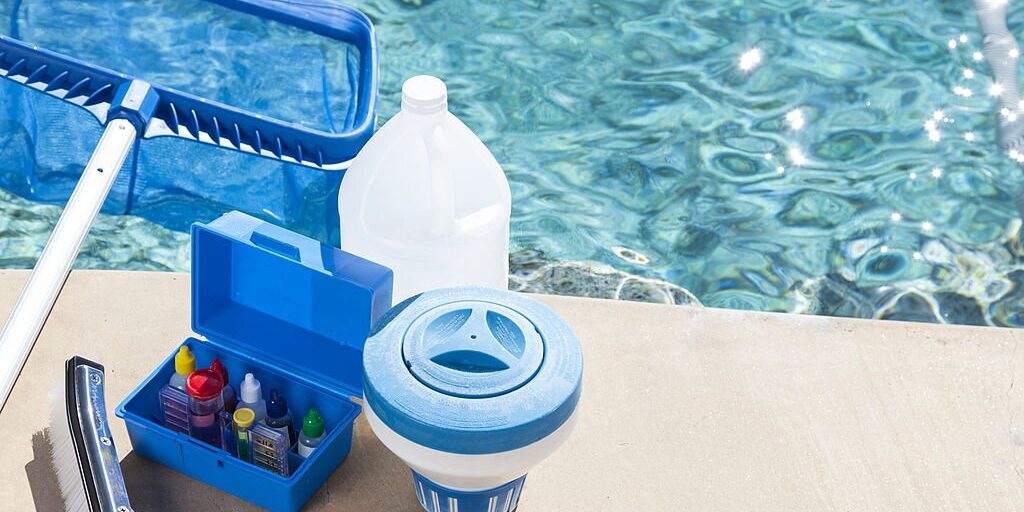Owning a swimming pool in Toronto is a wonderful luxury, offering countless hours of relaxation, exercise, and entertainment. However, regular maintenance is essential to ensure that your pool remains in pristine condition and continues to provide enjoyment for years to come. In this guide, we will explore the importance of swimming pool maintenance, learn about the basic pool parts, and discuss the necessary products and tips for maintenance.
Why is Swimming Pool Maintenance Important?
Regular swimming pool maintenance is crucial for several reasons. Firstly, it helps to keep the pool water clean and safe for swimming, reducing the risk of waterborne illnesses and infections. Toronto experiences various weather conditions throughout the year, and without proper maintenance, pools can quickly become breeding grounds for bacteria, algae, and other harmful organisms. By regularly testing and balancing the water chemistry, you ensure that the pH, chlorine, and other chemical levels are within the recommended range, creating a healthy swimming environment.
Secondly, proper maintenance extends the lifespan of your pool and its various components. Regular cleaning and maintenance tasks prevent the accumulation of debris, algae, and scale, which can cause damage to the pool’s interior, filter system, and other equipment. By addressing any issues promptly and maintaining a clean and well-functioning pool, you can avoid expensive repairs or the need for complete equipment replacements in the future.
Lastly, maintaining your pool ensures that it remains visually appealing, enhancing the overall aesthetics of your property and creating a welcoming environment for friends and family. Clean and sparkling pool water, well-maintained pool surfaces, and functional equipment create an enjoyable swimming experience and a beautiful outdoor space for relaxation and entertainment.
Learn About the Basic Swimming Pool Parts
For effective swimming pool maintenance, it is essential to understand its basic parts and their functions. Here are the key components you should familiarise yourself with:
Pool Water
The quality and balance of your pool water play a crucial role in maintaining a safe and enjoyable swimming environment. Toronto’s changing weather conditions, rainwater, and environmental factors can affect water chemistry. Regular testing and chemical adjustments are necessary to keep the water balanced and free from harmful bacteria. Testing kits are readily available to measure pH, chlorine, alkalinity, and other chemical levels. Maintaining proper water chemistry can prevent issues like cloudy water, algae growth, and skin or eye irritation.
Pool Filter System
The filter system is responsible for removing debris, dirt, and other impurities from the pool water. It consists of a pump that circulates the water and a filter that traps particles, ensuring clean and clear water. Depending on the type of filter system you have (sand, cartridge, or diatomaceous earth), regular maintenance is required. This includes cleaning or backwashing the filter, replacing filter cartridges, and monitoring the pressure gauge to determine when cleaning is necessary. Keeping the filter system clean and functional ensures effective water filtration and prevents clogs or equipment damage.
Pool Interior
The pool’s interior surface, such as plaster, fiberglass, or vinyl, requires regular cleaning to prevent the buildup of algae, stains, and scale. With its varying temperatures and precipitation, the climate can lead to rapid algae growth and mineral deposits. Regular brushing of the pool walls and floor helps to remove algae and prevent stains. Additionally, using a pool vacuum to remove debris from the pool bottom is essential for maintaining cleanliness. It is important to use a vacuum specifically designed for vinyl surfaces to prevent damage to vinyl pools. Keeping the pool interior clean and well-maintained ensures its longevity and visual appeal.
Pool Skimmers & Returns
Skimmers are located along the pool’s edges and help to remove debris from the water’s surface. They act as the first line of defense against leaves, insects, and other floating debris, preventing them from sinking and causing further issues. Regularly emptying and cleaning the skimmer baskets ensures proper water flow and prevents clogs. Returns, on the other hand, are the outlets that distribute clean, filtered water back into the pool. Ensuring these components are clean and functional is vital for efficient water circulation and maintaining a balanced pool environment.
Invest in the Right Products
Maintaining your swimming pool in Toronto requires using various products specifically designed for pool care. Here are some essential items you should have on hand:
Filter Cleaner & Scale Remover
Regularly cleaning your pool’s filter and removing scale buildup is crucial for maintaining proper water flow and preventing clogs. Over time, debris and minerals can accumulate in the filter, reducing effectiveness. Using specialized filter cleaners and scale removers helps to dissolve and remove these deposits, ensuring optimal filtration and preventing damage to the filter system.
Water Clarifier
Water clarifiers help to eliminate cloudy water by coagulating small particles, making them easier for the filter to remove. Factors like heavy rainfall, excessive use, or inadequate filtration can lead to water cloudiness. Adding a water clarifier to the pool helps to improve water clarity and make it more visually appealing. Following the manufacturer’s instructions on swimming pool maintenance, apply the appropriate dosage of water clarifier based on your pool’s size and severity of cloudiness.
Algaecide
Algae growth is common in swimming pools in Toronto due to the warm and humid climate. Algae can quickly spread and cause green, yellow, or black discoloration in the pool water. An algaecide helps prevent and control algae, keeping the water clean and clear. Different types of algaecides are available, such as copper-based or non-metallic, and the choice depends on the specific algae problem and pool type. Follow the manufacturer’s instructions for application and dosage to effectively control algae growth.
Create Cleaning Schedules
Establishing regular cleaning schedules is essential for effective swimming pool maintenance. Having a routine in place lets you stay on top of necessary tasks and ensure your pool remains in optimal condition. Here are three types of cleaning schedules to consider:
Pump Circulation Schedules
Proper water circulation is crucial for maintaining clean and balanced pool water. The pool pump is responsible for circulating the water through the filter system, removing debris, and distributing chemicals evenly. Set a schedule for running your pool pump, ensuring the water is adequately filtered and circulated throughout the day. Running the pump for 8-12 hours daily is recommended, although factors like pool size, usage, and weather conditions may affect the duration. During the colder months or when the pool is not in use, adjust the pump runtime accordingly to conserve energy.
Cleaning Schedules
Regularly removing debris, such as leaves, insects, and other floating items, from the pool’s surface and bottom is necessary to maintain cleanliness. Establish a weekly cleaning schedule for skimming the surface, brushing the walls and floor, and vacuuming any debris. Skimming should be done daily or as needed, especially during periods of heavy foliage or storms. Brushing the pool walls and floor helps to prevent algae buildup and remove any stubborn dirt or stains. Vacuuming should be done weekly, using either a manual or automatic pool vacuum, to remove debris settling on the bottom. Consider using an automatic pool cleaner for more efficient cleaning if you have a large pool or limited time.
Maintenance Schedules
In addition to regular cleaning, certain maintenance tasks need to be performed on a monthly basis. This includes checking and adjusting water chemistry levels, inspecting the pool equipment for any issues, and cleaning or backwashing the filter system as required. Monthly maintenance schedules help ensure your pool’s overall health and longevity. Test the pool water for calcium hardness, total alkalinity, and cyanuric acid levels, and adjust them as needed using the appropriate pool chemicals. Inspect the pool equipment, such as pumps, filters, and heaters, for any signs of wear or damage. Clean or backwash the filter system to remove accumulated dirt and debris hindering filtration efficiency.
5 Swimming Pool Maintenance Tips for Pest Control in Summer
During the summer season, pests can become a nuisance around swimming pools. Here, we provide five tips to help you control pests effectively:
1. Cover Your Pool When Not In Use
Using a pool cover when the pool is not in use helps to keep out insects, leaves, and other debris. This reduces the chances of pests finding their way into the pool water. Pool covers also help to retain heat, reduce evaporation, and save energy, making them beneficial in multiple ways.
2. Keep Up With Regular Cleanings Using Proper Chemicals
Regularly cleaning your pool and using appropriate chemicals helps to prevent algae growth and eliminate organic matter that can attract pests. Skimming the pool surface, brushing the walls and floor, and vacuuming debris are essential cleaning tasks. Additionally, maintaining proper water chemistry by testing and adjusting pH, chlorine, and other chemical levels helps to create an environment that is less attractive to pests.
3. Keep Your Garden Separate From Your Pool
Maintaining a distance between your pool and garden can help reduce the chances of pests migrating from the garden to the pool area, such as ants or termites. Ensure that trees, shrubs, or plants near the pool are properly trimmed and do not provide direct access to pests. Regularly inspect and remove any fallen leaves or organic matter from the pool surroundings.
4. Pool Lighting Can Attract Bugs
Pool lighting, especially during the evening, can attract insects like mosquitoes and flies. Consider using bug-repellent lighting around your pool area to minimize the attraction of insects. LED lights are often less attractive to bugs compared to traditional incandescent lights. You can also use citronella candles or torches as a natural deterrent for mosquitoes.
5. Be On The Lookout For Ants And Termites
Ants and termites can cause damage to the pool area and its surroundings. Regularly inspect your pool area for signs of ant or termite activity, such as mud tunnels, wood damage, or ant trails. If you notice any, take prompt action to eliminate the pests and prevent potential damage to your pool or property. Consult a professional swimming pool maintenance service if you require assistance dealing with ants or termites effectively.
In addition, here are some do’s and don’ts you must read before starting your pool maintenance tasks.
Are You Looking to Install a Bespoke Swimming Pool in Toronto?
Imagine having your very own custom-designed swimming pool right in your backyard, where you can unwind, exercise, and create lifelong memories with your loved ones. At Luxury Pools, we specialize in creating stunning and personalized swimming pools in Toronto that perfectly complement your lifestyle and enhance the beauty of your property.
Our team of experts is dedicated to bringing your vision to life. From the initial design concept to the final installation, we ensure attention to detail, quality craftsmanship, and exceptional customer service every step of the way. Whether you desire a sleek and modern pool or a luxurious oasis, we have the expertise to create the perfect swimming pool tailored to your unique preferences.
Contact us today at 416.504.5263 or email us at info@landcon.ca to schedule a consultation with our experienced team. Let us make your dream of owning a bespoke swimming pool in Toronto a reality.







